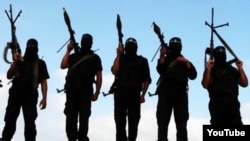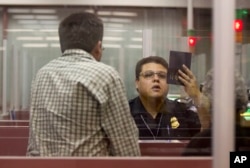Jihadist groups like Islamic State and al-Qaida could use the controversy over the disputed U.S. travel ban on seven Muslim-majority nations as a way to recruit followers, according to some analysts.
U.S. President Donald Trump vowed Saturday to overturn a federal judge's order temporarily blocking his executive order banning travel to the U.S. from several Middle Eastern countries. He called the ruling "ridiculous."
The Trump Administration has been arguing the ban on those seven nations is temporary in nature until a broader policy is developed.
But as protests and legal wrangling over the ban continue, some analysts are concerned that terrorist organizations will be using the controversy to expand their reach.
The SITE Intelligence Group, a U.S.-based terror monitor, wrote that jihadists said President Donald Trump’s executive order, which set in motion the temporary ban, revealed "America’s hatred towards Muslims.”
The White House has said the restrictions are about safety and protecting the U.S. border. Iraq, Iran, Libya, Yemen, Syria, Somalia and Sudan are the affected countries.
While highly unpopular overseas, the 90-day ban on citizens of those countries is supported by roughly one-half of all Americans, according to polls, and is consistent with repeated promises made by Trump during his election campaign.
Homeland Security Chief John Kelly said at a news conference this past week that the ban is not aimed specifically at Muslims, adding his agency's mission "is to safeguard the American people, our homeland, our values."
But Rand Corporation senior political scientist Jonah Blank says IS quickly seized on the issue as a recruiting tool.
“The Islamic State has already been using this [the travel restrictions]... and its adherents have been using it in a variety of social media,” said Blank.
‘Creating hostility’
Anthony Cordesman, a national security analyst at the Center for Strategic and International Studies, said the ban provides a narrative for jihadists that plays into their thinking.
“You are even doing a greater job of creating hostility between Muslims and non-Muslims which is one of the key goals of movements like IS and al-Qaida,” he said.
The Trump administration has cautioned that the policy is still evolving.
Seth Jones, director of the International Security and Defense Policy Center at the Rand Corporation, said Trump’s policies in the longer run will tell more about the possible impact on jihadist recruiting.
“I think a lot depends on what happens after the ban ends and what process will the U.S. take,” he said. “Will it open up to asylum seekers and refugees from a range of these countries like Somalia, Syria and Iraq?... If the U.S. puts into position a policy where it bans a certain religion from coming in from a certain number of countries, that could be problematic.”
Targeting wrong people
David Sterman, an analyst with New America, said the issue of homegrown terrorism has been overshadowed by the debate and protests over the ban.
“At New America, we have looked at our data which we have collected and put on our website,” he said. “We found that of the deadly attackers inside the U.S. since the 9/11, all of them are either U.S. citizens or legal permanent residents of the U.S., and none of them came from one of the countries covered by the ban.,”
“There is very little if any evidence that the ban itself does anything to protect American national security,” he said.
Still, proponents of the ban say it is an important move toward stopping jihadist expansion efforts.
“It is a temporary step and I think it is important for the United States, considering the environment that we face internationally, and transnational terrorism and the history of the last couple of years, the rise of the Islamic state, threats from other terrorist organizations, that’s very reasonable for the administration to take a look at this.” said Peter Brookes, a senior fellow for national security affairs at the Heritage Foundation.
“It is fair for a new administration to ask its departments involved in this to review how we are allowing entry in to the United States, especially from these seven countries that are in same way terror affected,” he said.







